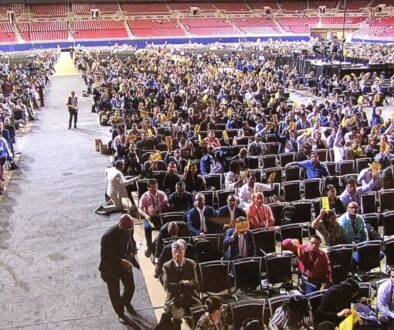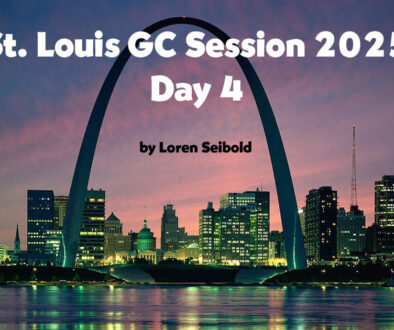Response to “Samoa’s Sabbath Wars” (Adventist Today Magazine Fall 2017)
6 March 2018
Dear Editor,
We are grieving and feel betrayed by your article, Samoa’s Sabbath Wars (Fall 2017 magazine), in which writer Bjorn Karlman, added his personal defence of Seventh-day Adventist Sunday keeping by stating as facts, “the lost day,” “the seventh day now called Sunday,” and “Saturday became the sixth day.” The very lies which will have to be repeated to every new generation of Adventists worldwide in order to sustain our Church’s Sunday keeping in Samoa.
When we wrote to Adventist Today we expected an unbiased presentation of the seriousness of our Church’s Sunday keeping in the Pacific as a straightforward, black and white issue, not to be complicated with journalistic indulgence, wide of the subject. The Church’s Sunday keeping in Tonga, Wallis & Futuna, Kiribati, etc., is relevant to Samoa’s Sabbath Wars, but the Gregorian, solar-based calendar vs the Jewish lunar calendar has nothing to do with a majority of local Adventists refusing to accept the International Dateline (IDL) shift in 2011 and thereby becoming Sunday keepers.
For Bjorn to say there are “awkward places for Sabbath keepers” is to introduce the idea that some locations on earth, like the Pacific, have God-created disadvantages for His people to obey the fourth commandment, thus requiring extra Church discernment and intervention. His digression, “perhaps the most complicated of the inconvenient regions is the Far North. In my native Sweden for example…” dealt only with the issue of sunset, not which day is the Sabbath. He answers his digression with a quote from Robert Leo Odom’s book, The Lord’s Day On A Round World, “the observance of God’s holy day was never thought by the Lord to be something impossible for man to do as the human family should spread over the face of the Earth.” But are there now “awkward places for Sabbath keepers” created in the minds of readers as a result of your article?
His next quote is profound and condemning of the Sunday keeping position he has taken: “Neither Sundaykeepers nor Sabbathkeepers have any difficulty knowing when to begin their religious rest days in the Far North.” This quote brings us right back to the Saturday vs Sunday issue and shows that both groups know which is the seventh and which is the first day of the week in the Far North. If Sabbath keepers and Sunday keepers are so informed in the Far North for Bjorn to use as worthwhile evidence to solve the problem, why can’t we rely on the intelligence of either group in Samoa, and not have to defer to the Biblical Research Committee (BRC) of the South Pacific Division (SPD) of Seventh-day Adventists?
Why did he consider the Jews when he knew, “that there was basically no Jewish community of any kind in Samoa?” Why not consult the “about 300 [Seventh-day Adventists] who continue to worship on Saturday?” Why not consult the far larger group of Samoan Independent Seventh-day Adventists who also keep the Saturday Sabbath of the Church they have broken away from? Why not consult the Sunday keeping Churches who know they’re keeping the first day of the week? Why not consult the non-religious? None of these people believe in such things as, “the new Saturday,” “the new Sunday,” etc. Neither do we nor many others inside and outside Samoa. Is everybody uninformed about international timekeeping except the BRC and their followers? Did the Seventh-day Adventist Church invent international timekeeping? Is the Seventh-day Adventist Church the custodian of authentic international timekeeping? To obey the fourth commandment, must we abide by the ruling of the South Pacific Division and keep Sunday in Samoa?
Your article begins, “As December 29th of that year ended, the countries of Samoa and Tokelau jumped westward across the IDL . . . this shift meant that the island nations were no longer 18 to 23 hours behind New Zealand and Australia.” Since Samoa and Tokelau now celebrate Saturday and Sunday 1 to 6 hours ahead of Australia and New Zealand, they cannot be considered to have lost a day, therefore there must be another way of looking at the situation in spite of Adventist Today’s presumptuous, overruling, and arrogant drop headline: “Any way one looks at it, a day was lost for the island, and Saturday there became the sixth day.”
Robert L Odom explained throughout his revised 1970 edition, that time cannot be gained or lost. It is unscientific. Nobody in Samoa was a day younger as a result of their jumping of the IDL and the so-called, “lost day.” Charles Taylor in his book, The Marked Bible (Signs Publishing), put it this way:
“Two men – twins – start from New York to make the journey around the world. One goes eastward, the other westward. They finally come together again in New York, after a lapse of several months; but he who went eastward finds himself exactly the same age as his brother who travelled the opposite direction. They compare figures and find that it took each of them the same number of days, hours, and minutes to make the trip, though one added a day and the other dropped a day. Now, if it is actually true that one gained and the other lost a day there must have been two days’ difference in their ages at the journey’s end and if they had repeated the process a sufficient number of times, there would have come a time when one would be old enough to be the other’s father. You all see how ludicrous the matter appears when analyzed but a little. The truth is, the whole question is one not of gaining or losing time but of computation.”
As explained by Odom (1970 edition), the only correct way of looking at the so-called lost day is shown in the chapter on the Philippines (p116). In a situation the same as Samoa in 2011, when a realignment to Asian timekeeping was undertaken, Tuesday, Dec 31, 1944, “was omitted as if it had already passed and the day after Monday was Wednesday.”
In our experience, those who support Adventist Sunday keeping, like Odom, are very selective as to whether or not they agree with such time adjustments. They agree with the “six-day week” of the Philippines in 1944, and the “eight-day week” of Samoa in 1892 (ibid p141,142), because according to them, it “rectified” Samoa’s time count, but they dispute the validity of Samoa’s “six day week” in 2011 because it doesn’t suit their agenda of keeping their perceived “exact seven-day sequence” from creation till now. God did not prescribe where the days begin and end on our round world, therefore such an unbroken seven-day sequence as taught by some in the Church is legalism, void of any divine input. It demonstrates a lack of faith in Providence and divine grace, and a taking of the law into one’s own hands in this matter.
The function of the International Dateline only reflects the decision of nations to either be in keeping with Eastern time (Asian) or Western time (American). Odom wrote in his earlier (1946) book of the same title (page 165) “The precise location of the Dateline is not established by a law of God, but rather is fixed by an agreement between the nations.” Knowing this fact, which was always true, it was sinful of him to reproduce the records of our missionaries who made their own international dateline a moral, right and wrong issue in their calculation of the Sabbath, rather than to simply abide by a nation’s choice of Asian or American time. In 1970 Odom hoped that the Tongan government would fall into line with Adventist thinking. He said,
“Back in 1915 considerable discussion arose on the Sabbath question in Tonga as it related to the local time count and the international dateline. Many thought that “a change of government will very likely bring about a change of day.” That hope has not seen realization. Yet . . . we should not be surprised to see the Tongans of the Friendly Islands rectify their time count and fall into line. . .”
Odom reflected Adventist thinking that God would support the Adventist missionaries’ dateline theory by inspiring the Tongan government to at some stage shift the dateline east and also have a six-day week which would produce a Saturday Sabbath by their reckoning. He never anticipated that other Island nations, around the year 2000, would “unrectify” their timekeeping in line with Tonga. Obviously there is no standard by which we could claim that they rectified their timekeeping since nations have the choice. There’s nothing to rectify.
Sadly, Odom’s revised 1970 edition is laced with this selective thinking and propaganda to support Adventist Sunday keeping (unlike his first edition in 1946). Such irrationality can be clearly seen in chapter 15, The Friendly (Tonga) Islands. Quoting the record of missionary E H Gates, he says, “The [seventh-day] Sabbath is kept here through a mistake of the early missionaries when crossing the dayline from the west [side].” (p163). “the London Missionary Society’s ship, Duff, landed several of its missionaries on the islands in 1797 and more arrived in the following years. In 1826, the Wesleyans sent John Thomas and wife.” (p162). On page 74 he says that the process of establishing an international date line did not begin till 1882. The obvious question is, how could these early missionaries make a mistake when crossing the “dayline” from the west side when no such line existed until the 1880s, some 60-80 years later? Even if the IDL had been in existence in 1797 or 1826 (east of Tonga as shown on page 77), those missionaries could not have crossed it from the west side while travelling to Tonga because the dateline was never in their path. So what dayline was E H Gates referring to? Obviously his own, which then became adopted by the Church.
Contrary to Bjorn’s view, “The official stance of the Division, which stresses the importance of maintaining the seven-day sequence,” does not make sense on paper, unless one has been brainwashed by the Division’s propaganda, because it is impossible to honestly explain Seventh-day Adventist Sunday keeping in everyday life. The only way of maintaining the seven-day sequence in the event of crossing the IDL is to add a day to one’s reckoning or take a day away, which the official stance of the South Pacific Division refuses to do. Their reasoning is, “a piece of land that cannot move cannot be likened to a traveller crossing the dateline.” According to them, Samoa did not move, the dateline did. That is why our Church leaders can cross the dateline and gain or lose a day in their reckoning (have a six or eight-day week), conscience-free. But Samoa cannot when the IDL is moved. Therefore, we find it somewhat amusing that Bjorn should begin his presentation likening Samoa to a traveller crossing the dateline when he says, “Samoa and Tokelau jumped westward across the IDL,” doing what the Division said could not be done, and yet he agrees that Samoa cannot lose a day like a traveller. “Jumping westward, across the IDL,” sounds like travelling to us. Whether it is done like a sack race or the hurdles, “jumping across” is travel. This illustrates how stupid and petty the Division’s argument is. Samoa is now west of the IDL whether Adventist leaders like it or not, and the Church in Samoa now should keep Asian time to be in harmony with the world and themselves. No Church has the biblical base to dispute global timekeeping and it is ironic that the Seventh-day Adventist Church is the only one that does, putting itself out of harmony with the seven-day sequence, hence its Sunday keeping.
For AT to show confidence in the BRC’s response on the subject is also misplaced. They are so out of touch that they quoted British newspapers to prove that there was a lost day, in the instance you quoted in response to Pr Neone Okesene’s paper. The novelty factor of the “lost day” for British newspapers was not in its reality but it’s rarity. Illusions hold a fascination and Samoa’s “lost day” illusion was of public interest, but a traveller’s “lost day” when crossing the IDL is so commonplace it is unlikely to ever be reported in a newspaper. Yet there is no difference between the two.
If Adventist Today is to play a part in edifying the church in this matter it must, at the very least, be neutral by using such terms as “the alleged calendar change,” “the so-called lost day,” etc. It is unprofessional of the journalist to quote us but then to state the official church position as fact. We seek redress from you by publishing this full response. We would like ourselves and the SPD and BRC to be interviewed by your magazine and given the opportunity to answer any questions you or your readers may have on the subject of Adventist Sunday keeping.
We still assert that Saturday is the seventh-day Sabbath throughout the world and Adventists can still have confidence in this fundamental of the Church.
Yours in Christ’s service,
Robert Vincent, phone +6494397946
New Zealand
John Wallace, phone +64211255064
New Zealand




